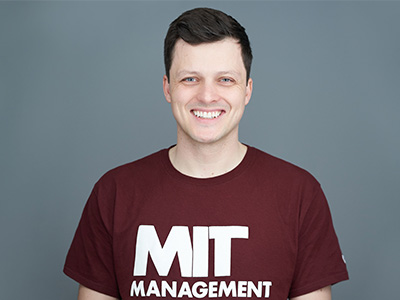Brad Flaugher is an engineer. He loves complex data-heavy projects that involve everything from Artificial Intelligence to machine learning and beyond. In 2016, he founded his own software development firm, Bread Factory Studios, which was acquired by international software development company Inoxoft in 2018 and has since grown to boast nearly 200 team members and myriad satisfied clients. Over the years, in addition to his evolving role with Inoxoft, he has worked full-time as a machine learning engineer on intricate projects for data platform clients like Audigent and Procter & Gamble. Yet, even with all of the projects and people he has led during his extensive engineering career, he always struggled with the idea of management science.
That is, until he began pursuing an Executive Certificate in Technology and Operations with MIT Sloan Executive Education.
“MIT made it so accessible,” explains Flaugher, who officially received his certificate in March of 2022. “I was learning about management, but it was MIT management, and I was able to fully buy into it, which was amazing.”
A Fresh Approach
For Philadelphia-based Flaugher, it made sense to take live online courses like Managing Complex Technical Projects, Managing Technical Professionals and Organizations, and Visual Management for Competitive Advantage: MIT’s Approach to Efficient and Agile Work. Together, these courses have allowed him to take a different approach to planning out the workflow of projects and actually map out the challenges, the goals, the steps involved, and even the individuals who will be assigned take on different tasks to get the job done.
“It’s easy to say there’s a problem, but it’s hard to explain how it’s going to get solved,” Flaugher notes. “For instance, while I was taking the Managing Complex Technical Projects course, I was mapping out a design structure matrix for one of my clients. I was able to create visuals and explain the solution. I could visually point out what our priorities were and show the design of the team. It made it easier not only to organize internally, but also to communicate with the client. And the solution had some management science data behind it. For so long, I had these solutions in my head, but I didn’t have the words to describe them. Now I do, so the courses were super helpful.”
Unexpected Outcomes
To complete his certificate, Flaugher took Blockchain Technologies: Business Innovation and Application. While the course seemingly was not applicable to the exact projects he was managing at the time, it actually worked to his advantage, allowing him to learn about a new technology and add to his growing tech repertoire. It also introduced him to a host of new colleagues who have become an integral part of his professional network—just like each Executive Education course in which he participated.
"It’s easy to say there’s a problem, but it’s hard to explain how it’s going to get solved."

“I didn’t realize that I would develop such a connection with the professors in particular,” he says. “But I have had the opportunity to reach out and have one-on-one conversations with professors like Ralph Katz from the Managing Technical Professionals class. At the end of the course, he actually said to us, ‘If you have any questions in the next 10 years, e-mail me.’ And I did. When I do something like that, I can go back to work and not just say, ‘Here’s what I think.’ I can say, ‘Here what I and my MIT mentor think.’ It gives you a bit of muscle in your corner that you might not have had before.”
That level of confidence and respect is not something Flaugher, who recently published the book AI Harmony, expected when he began his MIT Sloan journey, but he sees how it has changed him. “I feel like a manager now,” he concludes. “I feel like MIT was a safe place for someone who was a management skeptic to learn about management. And now I feel like a manager who has a good level of support as well. Management science is no longer scary to me. I know who I can go to to ask questions. I know I have resources. And if I want to learn more, I can access that. I heard someone once say that he likes to keep 70 percent of his bookshelf full of books he hasn’t read yet. Now, with MIT, I feel like I have my bookshelf stocked with people and courses I can turn to. And it’s MIT. They are really nice leather-bound books.”








